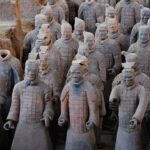Unit 731 was a covert biological and chemical warfare research unit of the Imperial Japanese Army during World War
It was established in 1937 in the Pingfang district of Harbin, China, and its primary objective was to develop biological weapons for use in warfare. Led by Lieutenant General Shiro Ishii, Unit 731 conducted numerous brutal experiments on human subjects, including prisoners of war, civilians, and even children. The unit’s activities were shrouded in secrecy, and its existence was not widely known until after the war.
Key Takeaways
The brutal methods of experimentation used by Unit 731
Unit 731 conducted a wide range of experiments on human subjects, with the aim of developing biological weapons and studying the effects of diseases on the human body. These experiments included vivisections without anesthesia, forced infections with diseases such as anthrax and bubonic plague, frostbite experiments, and testing the effectiveness of various chemical agents. The victims were often subjected to extreme pain and suffering, and many died as a result of the experiments.
The methods used by Unit 731 were incredibly inhumane. Vivisections were performed on live subjects without anesthesia, with the purpose of studying the effects of diseases on the human body. Victims were often dissected while still conscious, their organs removed one by one to observe the progression of disease. Other experiments involved infecting victims with diseases such as anthrax or bubonic plague, either through injection or exposure to contaminated materials. These victims would then be observed as their bodies deteriorated and eventually succumbed to the disease.
The victims of Unit 731: who were they and how were they chosen?
The victims of Unit 731 were primarily Chinese civilians and prisoners of war, although there were also Korean and Russian prisoners used for experimentation. The unit targeted these individuals because they were seen as expendable and had no value in the eyes of the Japanese military. The victims were often chosen at random, with no regard for their age, gender, or health status.
The selection process for victims was brutal and arbitrary. Chinese civilians were often rounded up from villages and towns and brought to Unit 731 for experimentation. Prisoners of war were also used, with many being captured during the Japanese invasion of China. Once at Unit 731, the victims would be subjected to a series of tests to determine their suitability for experimentation. Those who were deemed fit would be subjected to the various experiments, while those who were not would be killed or used as control subjects.
The role of the Japanese military in Unit 731’s operations
The Japanese military played a crucial role in supporting and facilitating Unit 731’s operations. The unit was officially part of the Imperial Japanese Army’s Epidemic Prevention and Water Purification Department, and its activities were sanctioned by high-ranking military officials. The military provided the necessary resources and manpower for Unit 731 to carry out its experiments, including supplying prisoners of war and civilians for experimentation.
The military’s support for Unit 731 was driven by a desire to gain a strategic advantage in warfare. The Japanese army saw biological weapons as a way to incapacitate enemy forces without causing widespread destruction or loss of life. They believed that by developing these weapons, they could gain an edge over their adversaries and secure victory in the war.
The aftermath of Unit 731’s experiments on the surviving victims

The survivors of Unit 731’s experiments faced severe physical and psychological effects as a result of their ordeal. Many suffered from chronic pain, disabilities, and disfigurement due to the experiments they had been subjected to. Additionally, they experienced long-term psychological trauma, including nightmares, anxiety, and depression.
The physical effects on the survivors varied depending on the type of experiment they had undergone. Those who had been subjected to vivisections often had permanent disabilities and disfigurement, as their organs had been removed or damaged during the experiments. Victims of disease experiments often suffered from chronic health issues, such as respiratory problems or weakened immune systems.
The psychological impact on the survivors was equally devastating. Many experienced nightmares and flashbacks of their time at Unit 731, and some developed post-traumatic stress disorder (PTSD). The survivors also faced social stigma and discrimination, as their experiences were often not acknowledged or understood by society.
The international response to Unit 731’s atrocities
The international community was largely unaware of Unit 731’s activities during World War
It was not until after the war, when the unit’s existence was revealed, that the full extent of its atrocities became known. The revelations shocked the world and led to calls for justice and accountability.
In response to the atrocities committed by Unit 731, the Allied powers established war crimes trials to hold those responsible accountable for their actions. However, due to geopolitical considerations and a desire to gain access to the unit’s research, many of the individuals involved in Unit 731 were granted immunity in exchange for their cooperation.
The legacy of Unit 731 in modern Japan
Unit 731 remains a controversial and sensitive topic in Japan today. While there are efforts to remember and acknowledge the victims of Unit 731, there is also a significant amount of denial and revisionism surrounding its legacy. Some right-wing groups in Japan deny or downplay the unit’s atrocities, while others argue that it was necessary for national security.
The controversy surrounding Unit 731’s legacy has led to a lack of education and awareness about its atrocities in Japan. Many Japanese citizens are unaware of the unit’s existence or its role in World War
This lack of awareness perpetuates a cycle of denial and ignorance, making it difficult for the victims to receive the recognition and justice they deserve.
The ethical implications of Unit 731’s experiments
The experiments conducted by Unit 731 raise significant ethical issues. The unit’s activities violated numerous principles of medical ethics, including the principle of informed consent, the duty to do no harm, and the respect for human dignity. The victims were subjected to extreme suffering and pain without their consent, and their lives were treated as expendable for the sake of scientific research.
The experiments also violated international laws and conventions, including the Geneva Conventions and the Nuremberg Code. These laws and codes were put in place to protect the rights and well-being of individuals involved in medical research, and Unit 731’s activities were a clear violation of these principles.
The impact of Unit 731 on medical research and ethics
Unit 731 had a significant impact on medical research and ethics. The unit’s experiments provided valuable data on the effects of diseases and chemical agents on the human body, which was used by both Japanese and Allied scientists after the war. However, this data came at a great cost, as it was obtained through unethical means.
The revelations about Unit 731’s activities led to a reevaluation of ethical standards in medical research. The Nuremberg Code, which was developed in response to the atrocities committed by Nazi doctors during World War II, was expanded to include provisions specifically addressing human experimentation. This code set the foundation for modern ethical guidelines in medical research.
Lessons learned from Unit 731: preventing similar atrocities in the future
Unit 731 serves as a stark reminder of the dangers of unchecked scientific research and the importance of upholding ethical standards. The atrocities committed by the unit highlight the need for strict regulations and oversight in medical research to prevent similar abuses from occurring in the future.
The revelations about Unit 731 also underscore the importance of education and awareness in preventing atrocities. By learning about the past and acknowledging the mistakes that were made, society can work towards ensuring that such atrocities are never repeated.
In conclusion, Unit 731 was a horrific chapter in human history. The unit’s brutal experiments and disregard for human life violated basic principles of ethics and human rights. The survivors of Unit 731’s atrocities continue to suffer the physical and psychological effects of their ordeal, while the legacy of the unit remains a controversial and sensitive topic in Japan. It is crucial that we remember and learn from the atrocities committed by Unit 731 to prevent similar abuses from occurring in the future.







